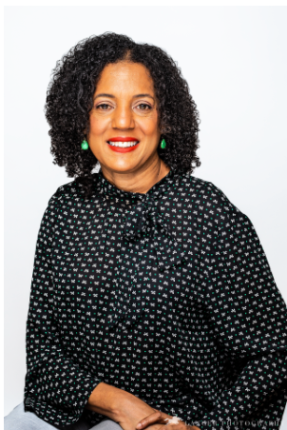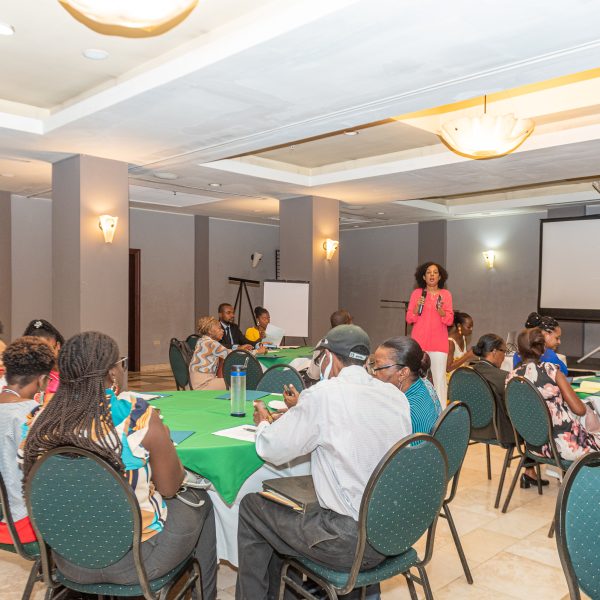Claudia Thomas Riché, Founder of NECH-CIEH
Haiti
Sector: Health Care
Scaling type: Scaling deep, scaling up, scaling out
Ashoka Fellow since 2019

Claudia Thomas Riche is a passionate advocate for nursing in Haiti, where a critical issue persists. As the largest profession in the country, nurses are uniquely positioned to identify health delivery challenges, advocate for patients, and make transformative systemic improvements. They are part of a multidisciplinary team, allowing them to communicate with and educate patients and their families over the long term, thus supporting them in sustaining healthy behaviors.
Unlike other countries, Haiti lacks a national board of nurses, leaving them without a centralized platform. Their roles are often limited, and their intellectual capabilities are rarely recognized. Most nurses end up in subordinate positions, with few opportunities for leadership or management roles, effectively silencing their ability to advocate for themselves and their patients.
Despite the challenges, Claudia firmly believes that nurses can be at the forefront of healthcare delivery and prevention in Haiti. In addition to her efforts to address the issue of the lack of a national board of nurses, Claudia co-founded the Nursing Education Collaborative for Haiti (NECH-CIEH) in 2014. This initiative created a network of collaboration among nurses, providing a space where their needs and concerns could take precedence, unlike typical medical associations that tend to prioritize the needs of doctors. Through projects and educational initiatives, Claudia’s association encourages women to come together and collaborate, fostering a sense of empowerment among nurses.

Claudia believes that health and medicine are intertwined with social structures. She empowers nurses through professional education and leadership skills, urging them to expand their roles and become health changemakers within their communities. Her approach focuses on grassroots efforts to change cultural norms, scaling deep to make a meaningful impact on people’s health and quality of life.
To put her beliefs into action, Claudia launched the Hand Hygiene Initiative. This grassroots effort aims to establish consistent and effective handwashing practices, disrupting the cycle of disease transmission in Haiti. Nurses from NECH-CIEH conducted a research study on handwashing in major hospitals across the country, collaborating with the Ministry of Health. The findings inform sustainable hand-washing training delivered by Haitian nurses in hospitals and communities. This initiative not only equips nurses with research skills but also helps them become respected opinion leaders within their communities and the medical profession. As a result, doctors understand the value of collaboration with highly educated and well-trained nurses, leading to more efficient and effective healthcare delivery.
As she worked alongside other Haitian nurses, Claudia recognized not only their eagerness to learn and improve but also the obstacles in their path. The space to scale out was there, but the means to do so needed to be overcome. Limited access to computers and the internet hindered their training and skill development. In response, NECH-CIEH established accessible spaces across the country, providing the necessary tools for advancement without extensive travel requirements. In addition, NECH-CIEH offered videoconference lectures in French, covering topics based on nurses’ requests and targeting the areas the nurses desired the most education. The recorded lectures granted nurses the flexibility to access education at their convenience, accommodating their busy schedules and individual circumstances.
However, scaling out did not stop with nursing education. Claudia firmly believes that nurses play a significant role in promoting good health, particularly for underprivileged individuals with limited access to hospital care. Through the Haitian Women’s Soap Project, local women were trained by NECH-CIEH nurses to create and market affordable multi-purpose soap, empowering them as entrepreneurs and reinforcing hygiene education within their communities. The soap project actively educates local communities on basic hygiene and disease prevention, fostering a culture of health and cleanliness in everyday life.
These initiatives demonstrate the extent to which Claudia and NECH-CIEH are dedicated to scaling out by enhancing Haitian nurses’ capabilities, fostering improved health practices, and uplifting communities across the country.
To institutionalize these changes at the national level and to scale up, Claudia has been collaborating with the Director of Nursing Care at the Ministry of Health. Their mutual goal is to improve and enhance the nursing curriculum, addressing gaps between theoretical knowledge and practical clinical and community skills. Early on, NECH-CIEH secured financing and oversaw the print publication of a 72-page manual titled “Normes pour la Pratique des Soins Infirmiers,” the first-ever compilation of nursing standards for Haiti. Distributing 1000 copies to all 900+ healthcare facilities, this manual represents the first official documentation of nursing standards in the country.
According to Claudia, NECH-CIEH’s success lies in achieving full recognition and support for nurses as the backbone of the healthcare system. Through the creation of a collaborative network, she is expanding nurses’ knowledge and skills beyond their formal education, allowing them to build their voice and confidence as changemakers. By implementing all three levels of scaling, Claudia has made massive strides into seeing that success come to fruition.
In the WISE theory of change, the three angles of the triangle: scaling up, scaling deep, and scaling out, are achieved in NECH-CIEH, which means that Claudia Thomas Riché changed the lives of Haitian women and children for generations to come.
By Bharati Chaudhari